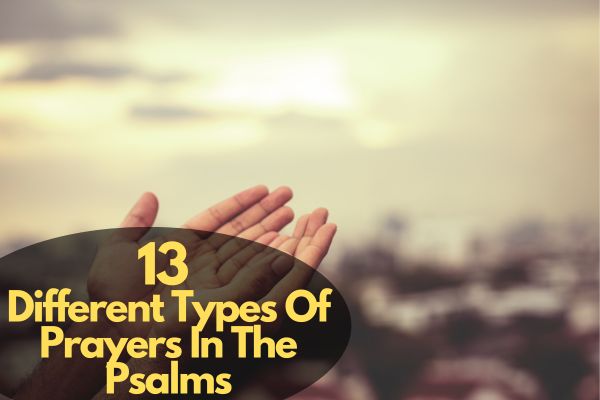Table of Contents Show
The Psalms, a poetic masterpiece in the Bible, reveal a diverse array of prayers, offering a profound glimpse into the human soul’s connection with the divine. In this exploration, we journey through the Psalms, uncovering the different types of prayers that echo across the ages, resonating with believers worldwide.
Different Types Of Prayers In The Psalms
As we explore the multifaceted prayers within the Psalms, we recognize the profound impact these spiritual expressions have on the human soul. From seeking forgiveness and divine protection to embracing wisdom and finding solace in times of grief, each prayer type offers a unique avenue for connecting with the divine.
Incorporating these prayers into our spiritual practices enriches our faith journey, fostering a deeper understanding of God’s grace, mercy, and wisdom. The Psalms serve as a timeless guide, reminding us of the power of prayer in nurturing our souls, fostering resilience, and guiding us toward a life rooted in faith and hope.
The Supplication Psalms: Pleading for Mercy and Help
In times of distress, supplication prayers emerge as heartfelt pleas for God’s intervention. Psalms of supplication express human vulnerability, acknowledging dependence on divine mercy and assistance.
The Thanksgiving Psalms: Gratitude Amidst Blessings
Thanksgiving prayers celebrate God’s benevolence and deliverance. These Psalms express gratitude for answered prayers, emphasizing the importance of acknowledging blessings with a thankful heart.
Praise for Deliverance: Thanksgiving prayers in the Psalms celebrate moments of deliverance, expressing gratitude for God’s saving grace and protection from adversaries.
Thanksgiving for Creation: Psalms also feature prayers expressing gratitude for the wonders of creation, highlighting the awe-inspiring beauty of the natural world and God’s divine craftsmanship.
The Penitential Psalms: Seeking Forgiveness and Repentance
Penitential prayers in Psalms reflect on human frailty and sin, seeking divine forgiveness and cleansing. These Psalms embody contrition, offering a path to redemption through repentance.
The Imprecatory Psalms: Crying Out for Justice
Imprecatory prayers express righteous anger and a desire for divine justice. Psalms in this category call upon God to confront evildoers, highlighting the need for moral accountability in the world.
Calling for Justice: Psalms contain imprecatory prayers, where individuals call upon God to deliver justice, especially in the face of oppression and injustice, expressing righteous anger against evildoers.
Vindication and Redemption: Imprecatory prayers also seek vindication, emphasizing the trust in God’s judgment and ultimate redemption, even in the midst of adversaries.
The Trust Psalms: Confidence in Divine Protection
Trust prayers emphasize unwavering faith and reliance on God’s protection. These Psalms convey confidence in God’s steadfast love, providing solace amidst life’s uncertainties.
Confidence in God’s Protection: Psalms feature prayers exuding trust, highlighting the unwavering faith individuals place in God’s protective presence, finding solace in the divine shield against adversaries.
Assurance in God’s Promises: Trust prayers reflect confidence in God’s promises, showcasing the steadfast belief in divine guidance, even in challenging circumstances, fostering hope and resilience.
The Wisdom Psalms: Seeking Divine Guidance
Wisdom prayers in Psalms reflect on God’s teachings, embodying the pursuit of divine wisdom and understanding. These Psalms emphasize the value of aligning one’s life with God’s wisdom.
Seeking God’s Presence: Meditative prayers express a deep yearning for God’s presence, showcasing the spiritual thirst of individuals longing for a closer relationship with the divine.
Conclusion: Embracing the Psalms’ Spiritual Diversity
The Psalms‘ mosaic of prayers offers a profound spiritual experience, encompassing human struggles, joys, and aspirations. Through supplication, thanksgiving, penitence, justice-seeking, trust, and wisdom-seeking prayers, believers find solace, guidance, and communion with the divine. Embracing the diversity of Psalms’ prayers enriches the spiritual journey, fostering a deeper connection with God.
Frequently Asked Questions (FAQs)
Q1: Are the Psalms relevant to modern believers? A1: Yes, the Psalms’ themes of human experience, faith, and divine connection remain timeless, resonating with believers across generations.
Q2: How can I incorporate Psalms into my daily prayer life? A2: You can select Psalms that align with your emotions or situations, using them as prayers or reflections during your prayer time.
Q3: Are there specific Psalms for times of joy and gratitude? A3: Yes, Psalms 100 and 103, among others, express gratitude and praise, making them ideal choices for moments of joy and thanksgiving.
Q4: Can Psalms offer comfort during times of grief and loss? A4: Absolutely, Psalms 23 and 34 are often turned to during times of grief, providing solace and reassurance of God’s presence.








